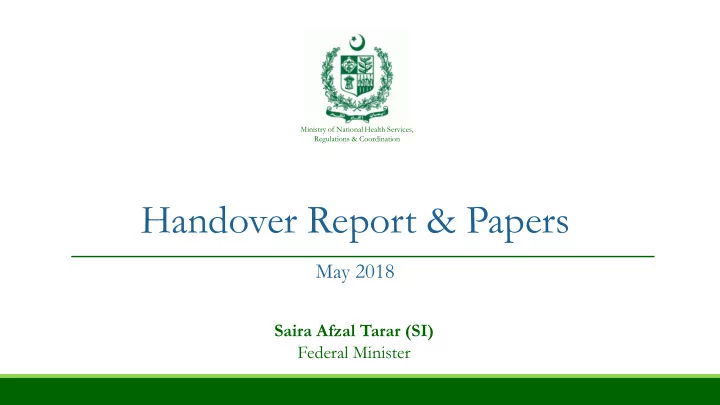

Ministry of National Health Services, Regulations & Coordination Handover Report & Papers May 2018 Saira Afzal Tarar (SI) Federal Minister
Some moments of reflection • Responsibility to update the Cabinet on the progress at the end of term • To communicate the successor Minister/s and Partners to ensure continuity in the momentum towards progress in the Health Sector & M/o NHSR&C
Key Achievements (Programmes) Prime Minister’s National Health Programme -Launched in 38 districts ( >2.8 million families enrolled) -72,721 families accessed services - PC-1 for nation-wide scaling up approved Polio Eradication - Only 1 case in 2018 vs 306 in 2014 Expanded Programme on Immunization - Coverage from 53.5% in 2012 to 82% in 2015 - Three new vaccines included
Key Achievements (Programmes) MNCH : About 4,000 maternal and 90,000 child deaths averted over 5 years and the Ministry contributed through funding of devolved national programmes and strategic dialogue with the provinces Nutrition : National food fortification programme Rs.10 billion allocated for nutrition in the current budget Population : Allocation increased from Rs.108 to Rs.1,500 millions in 5 yrs National AIDS, TB and Malaria (ATM) Programme : - TB detection increased from 57% in 2012 to 69% in 2017 with 93% success - 7 million insecticide impregnated bed nets distributed to prevent malaria - 22,333 AIDS patients enrolled for treatment
New schemes at development stage PM’s Directive to build 46 Hospitals ISO certification of AIDS, TB & Malaria Programme King Hamad University of Nursing and Associated Medical Sciences Family Practice Model to achieve Universal Health Coverage National Prevention Programme National Hearing & disability Screening Programme Cancer Treatment Programme in federating areas Mental Health Global Action Plan
Key Achievements (Regulations) Drugs Regulatory Authority of Pakistan (DRAP) - Fresh on merit recruitments of 300 technical staff in DRAP - Exports reached to a record level of >US$ 212 million in 2016-17 - Pricing Policy and Bar coding - New drugs ‘generic guidelines’ - (Sofosbvir – Quality local production saved lives of thousands of Hep–C patients - Level II of WHO pre-qualification for quality achieved; Level III by 2019 Councils (PMDC, PNC, PCP, NCT, NCH) - Conflict of interest issue addressed for the first time in the Councils - On line registration in Nursing, post graduate education in pharmacy
Key Achievements (Legislation) Approved HSA bill for up-gradation as ‘Public Health University’ Islamabad Healthcare Regulation bill Pakistan Health Research Council bill In final stages of approval Bill for Allied Health Workers (paramedic) Council Bill for Physiotherapists Council Other legislative reforms Human Organ Transplant (HOTA) amendment Tobacco Control amendment bill
Key Achievements (Institutions) ISO Certification of M/o NHSR&C and Vaccine Management & Tracking Creation of Health Policy Think Tank (HPTT) Establishment of Health Planning, System Strengthening and Information Analysis Unit (HPSIU) – Integrated Dashboard functional National Institute of Health - Completely revamped with new High Tech Bio-safety Level 3 lab, - National Reference Viral laboratory - Polio, Congo fever, Dengue control - Solo public sector producer of vaccine and sera – capacity enhanced National Institute of Population Studies – strengthening and carrying out Pakistan Demographic Health Survey
Key Achievements (Policy) National Health Vision 2016-25 Family Planning 2020 10 Points Priority Agenda to address Maternal & Child health issues National Action Plan on Health Security Pakistan Human Resources for Health Vision 2018-30 Disease specific Strategic Plans o EPI o AIDS, TB and Malaria (ATM) o Hepatitis and Blood Safety Strategic Framework for containment of Anti-Microbial Resistance
Key Achievements (Coordination national) Parliamentary Standing Committees and other mechanisms Inter- Ministerial - Pakistan Health & Population Strategic Forum Pakistan Health & Population Interagency Coordination Consortium International Health Regulations Task Force Other Task forces and Working Groups (One Health, AMR)
Key Achievements (Global leadership for Pakistan) 64 Session of WHO EMRO RC Meeting in Islamabad after a gap of 20 years Led the global agenda of ‘Improving access to Assistive Technologies’ through regional and global resolutions Contribution to Global Health Leadership - Chair of WHO-EMRO Regional Committee (2017-18) - Regular participation in World Economic Forum to advocate for ‘Health’ - Pakistan is Chair of WHO Executive Board (2017-18) - Pakistan is member of GAVI Executive Board - TB Control Champion Award 2016 Bilateral agreements with 10 countries and working with 25 Donors
Key Achievements (Health Expenditure) Public health expenditure : Only 0.23% of GDP in 2010-11 increased to 0.91% of GDP in 2016-17 Expected to cross the milestone of 1% of GDP in 2017-18 Share of federal government: 13.5-16.5%
Shaping the Future _ Recommendations for New Minister/s and Partners Continued Governance & Organizational Reforms in the health sector/Ministry Public Health Expenditure to a level of 3% of GDP by 2025 Implementation of National Health Vision to achieve UHC Scaling up of all National Priority Health Programmes (PMNHP+ EPI/ Polio) Health System Strengthening – four priority areas i. Develop capacities for International Health Regulations ii. More hospital beds to achieve the threshold of 18 beds/ 10,000 population iii. Meet the minimum threshold (4.45 per 1,000 people) of human resources for health iv. Availability of essential medicines at all levels – preferably free to all Strengthened Regulatory bodies and Accountability mechanisms Monitoring and accountability – One Health Survey every 3 years
“Essential health care for all citizens must be recognized as a right, not a favour” THANK YOU For more information, please visit www.nhsrc.gov.pk/
Recommend
More recommend